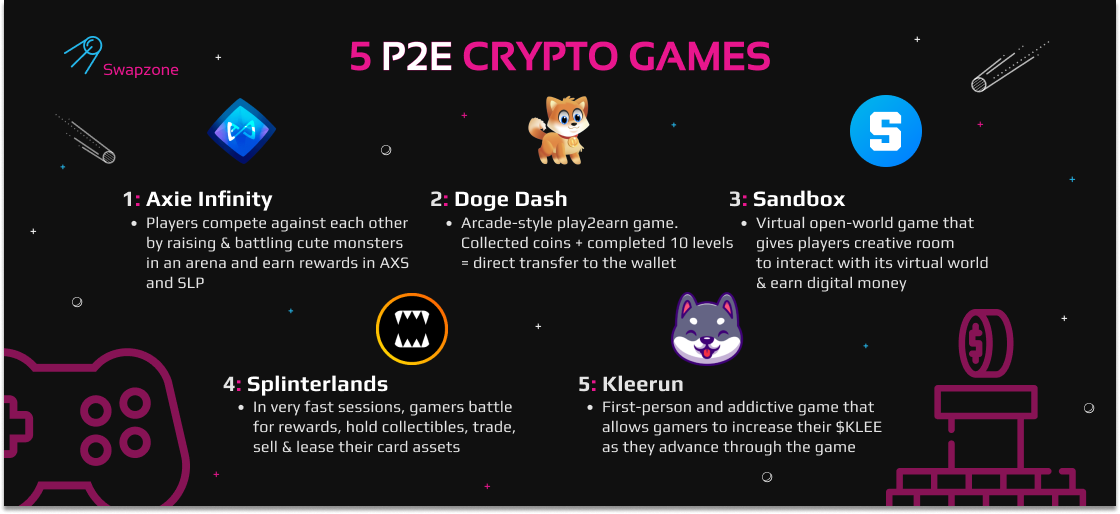Just How Play-to-Earn Incentives Are Transforming the Gaming Experience
This improvement welcomes players to spend not just their time however likewise their economic sources, fostering a sense of possession and much deeper interaction within game ecological communities. What ramifications could this have for the sector and its players?

Evolution of Video Gaming Versions
The landscape of pc gaming has undergone a significant makeover over the decades, evolving from conventional pay-to-play designs to extra cutting-edge frameworks that focus on individual engagement and money making. Originally, games were mainly sold as standalone items, calling for upfront payments for access. This version, while effective in creating income, frequently restricted player communication and neighborhood building.

Recently, the rise of blockchain innovation has actually introduced play-to-earn systems that basically change video gaming characteristics. These versions not just give a system for gamers to make rewards however likewise democratize the gaming economic climate, enabling users to own in-game assets. This development mirrors a broader trend in the direction of community-driven experiences, where designers and gamers collaborate fit the gaming landscape, eventually redefining just how value is perceived in the video gaming sector.
Benefits of Play-to-Earn Systems
Unlocking brand-new methods for player involvement, play-to-earn systems provide an array of benefits that fundamentally improve the pc gaming experience. These systems equip players by offering tangible incentives for their effort and time, promoting a feeling of ownership and financial investment in the game. This inherent motivation drives players to engage more deeply, exploring video game technicians and communities that they may or else ignore.
In addition, play-to-earn versions equalize gaming by leveling the having fun area. Players from various histories can take advantage of on their skills and creative thinking, enabling new entrants to experience economic benefits that were typically scheduled for designers and publishers. This change motivates a more diverse gamer base, improving the pc gaming ecosystem with different viewpoints and experiences.
In addition, play-to-earn systems promote area building, as players team up and compete within decentralized atmospheres. This interaction cultivates social links that boost pleasure and retention, as gamers really feel a sense of belonging.
Finally, these systems can lead to boosted durability for games, as continuous player engagement often converts right into continual passion and financial investment in future models or growths, making sure a lively gaming landscape.
Economic Impact on Gamers
Play-to-earn systems not only enhance see post gamer engagement but also have significant economic effects for individuals included. These systems enable gamers to monetize their time and skills, changing video gaming from a recreation right into a viable earnings source. As players make copyright or in-game properties that can be traded or offered in real-world markets, they acquire monetary rewards that can substantially affect their personal economic climates.
The economic design promotes a new wave of entrepreneurship, as gamers can invest in different gaming environments or create techniques to optimize their incomes. This possibility for income generation attracts a diverse market, including those in regions with limited job possibilities - play to earn rewards. Subsequently, many players are now seeing video gaming not just as amusement however as a pathway to monetary empowerment.
However, it is necessary to recognize the volatility associated with cryptocurrencies and the capacity for market fluctuations to affect incomes. Players have to navigate these threats while stabilizing their gaming and financial activities. On the whole, the financial effect on players is extensive, reshaping their connection with video gaming and opening opportunities for wide range creation in a significantly digital economy.
Neighborhood Building in P2E Games

Players in P2E settings often form guilds or alliances, developing networks that websites assist in resource sharing, tactical planning, and mutual support. These teams usually engage in participating missions or competitions, additionally reinforcing their bonds and enhancing the general gaming experience. Furthermore, community-driven occasions, such as competitions and social events, serve to unify players, foster friendship, and incentivize participation.
In addition, designers actively involve with their communities, including feedback and pointers that form video game growth. This collaborative method not just empowers gamers but likewise makes sure that video games advance abreast with player interests, improving fulfillment and long-term engagement. Inevitably, community building in P2E games is not merely a feature; it click to investigate is a fundamental facet that transforms the gaming landscape right into a much more comprehensive and interactive environment.
Future Trends in Gaming
The video gaming market's development is poised to accept several transformative patterns that will certainly redefine gamer involvement and experience. One of one of the most substantial trends is the combination of artificial knowledge (AI) to create even more tailored pc gaming atmospheres. AI can analyze gamer actions and choices, allowing developers to customize experiences that resonate deeply with individual users.
In addition, the arrival of virtual and augmented fact (VR/AR) modern technologies is readied to boost immersion, supplying gamers the ability to connect with electronic worlds in unprecedented ways. This will certainly not just elevate gameplay but additionally foster social links, as gamers can collaborate and compete in common environments.
Furthermore, the rise of blockchain technology will remain to affect the pc gaming landscape, allowing true ownership of in-game possessions through non-fungible symbols (NFTs) This pattern will certainly equip gamers to trade and monetize their video gaming experiences, better obscuring the lines in between pc gaming and investment.
Final Thought
By incorporating financial motivations right into gameplay, gamers are progressively engaged, fostering a feeling of possession and investment in digital environments. As these patterns continue to advance, the blurred lines between amusement and financial investment will likely redefine the future of pc gaming, shaping brand-new experiences for gamers worldwide.